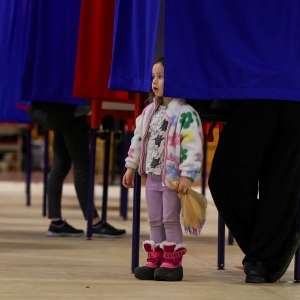No answers from NH Democrats on education funding

Democratic leaders in the N.H. House and Senate gathered Tuesday in the Legislative Office Building in Concord to discuss this year’s legislative session, set to start Wednesday. Creation of a new two-year state budget will be a main task for the Republican-controlled Legislature. RICK GREEN—Keene Sentinel staff photo
| Published: 01-08-2025 11:44 AM |
N.H. House and Senate Democrats held a news conference Tuesday to discuss their priorities, but they had no answers for solving the education funding problems that could come to dominate this year’s legislative session.
Lawmakers will soon begin drawing up a two-year budget while the N.H. Supreme Court is considering an appeal of a judge’s decision that the state must greatly boost funding for public schools.
As to where the money might come from to fund such a spending increase outside of property taxes, House Democratic Leader Alexis Simpson said, “I think that’s an excellent question for Republican leadership.”
Republican leaders were planning a news conference for Wednesday.
New Hampshire already has some of the highest property tax rates in the country and does not have a statewide income tax or a general sales tax. A Republican-led effort also repealed the interest and dividends tax effective Jan. 1.
Republicans increased their majorities in the state House and Senate in the Nov. 5 general election, so Democratic priorities will realistically be confined to trying to exert influence on certain bipartisan issues, Rep. Nicholas Germana, D- Keene, said after the news conference.
“I think it’s important that we talk about our values, but the bottom line is that a Democratic agenda has no chance, and so there are areas where we can work with Republicans,” he said.
Germana has been working on legislation aimed at improving environmental regulation involving solid waste disposal. He said this is one issue that has some bipartisan support. Other such issues, he said, could be increasing affordable housing and improving access to child care.
Article continues after...
Yesterday's Most Read Articles
 ‘Field of Dreams’ to ‘a dump’ – What golfers have to say about Concord’s plans to rebuild the Beaver Meadow clubhouse
‘Field of Dreams’ to ‘a dump’ – What golfers have to say about Concord’s plans to rebuild the Beaver Meadow clubhouse
 Man dies in RV fire in parking lot of Concord’s Steeplegate Mall
Man dies in RV fire in parking lot of Concord’s Steeplegate Mall
 ‘New Hampshire is just going to embarrass itself’: Former Child Advocate warns against proposed office cuts
‘New Hampshire is just going to embarrass itself’: Former Child Advocate warns against proposed office cuts
 John Swope, longtime Concord civic leader who spearheaded Capitol Center for the Arts, dies at 86
John Swope, longtime Concord civic leader who spearheaded Capitol Center for the Arts, dies at 86
 N.H. mulls immigration bill to ban sanctuary policies and overrule local control
N.H. mulls immigration bill to ban sanctuary policies and overrule local control
 Photos: An update on some of the Concord’s springtime building projects
Photos: An update on some of the Concord’s springtime building projects
In the House, there are now 215 Republicans, 173 Democrats and one independent, while there are 16 Republicans and eight Democrats in the Senate. Before the election, Republicans had a razor-thin majority in the House and a 14-10 advantage in the Senate.
Voters elected Republican Kelly Ayotte as governor, who will share power with the N.H. Executive Council, where Republicans maintain a 4-1 majority.
Simpson, of Exeter, said this means that Ayotte and her fellow Republicans “will own this year’s budget” and any cutbacks that might be needed to balance it.
This is expected to be a challenging budget year, in part, because federal pandemic relief money has ended and because of the repeal of the interest and dividends tax, which disproportionately affected households with high incomes.
Lawmakers have also made small reductions in recent years in the state’s business profits tax and in its rooms and meals tax.
Many Democrat lawmakers argue such reductions reduce state revenues and make the state more reliant on money from local property taxpayers. The counter argument is that these reductions stimulate the economy and increase revenue.
Meanwhile, uncertainty revolves around how the N.H. Supreme Court will rule on the state’s appeal of Rockingham County Superior Court Judge David W. Ruoff’s 2023 ruling that New Hampshire’s baseline public school funding should be at least $7,356 per pupil, almost double what it now is.
The ruling came in a lawsuit brought by the ConVal School District. Many other districts in the Monadnock Region and across the state have joined the litigation.
These articles are being shared by partners in the Granite State News Collaborative. For more information, visit collaborativenh.org.







 ‘A wild accusation’: House votes to nix Child Advocate after Rep. suggests legislative interference
‘A wild accusation’: House votes to nix Child Advocate after Rep. suggests legislative interference  Sununu decides he won’t run for Senate despite praise from Trump
Sununu decides he won’t run for Senate despite praise from Trump Town elections offer preview of citizenship voting rules being considered nationwide
Town elections offer preview of citizenship voting rules being considered nationwide Medical aid in dying, education funding, transgender issues: What to look for in the State House this week
Medical aid in dying, education funding, transgender issues: What to look for in the State House this week
